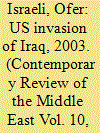| Srl | Item |
| 1 |
ID:
128845


|
|
|
|
|
| Publication |
2014.
|
| Summary/Abstract |
Narratives that dramatise and simplify conflicts should be corroded by exposure to complex reality. Yet they retain their mobilising power in the Middle East, topped up by conspiracy theories. To an outside observer, the picture that the Middle East conflict landscape offers is indeed complex and confusing. Littered with interlocking and overlapping conflicts, there is a wealth of narratives that allegedly explain why this is so, outlining who is the designated enemy or ally of whom, and for what reason. But when one compares the reality on the ground to these narratives, things often look quite different. In many instances, it almost seems that the conflicting parties have a distinct preference for allying not with their supposed brothers in spirit, but with their ideological opposites. The proverb 'the enemy of my enemy is my friend' seems a better guide to the Middle East conflict landscape. This raises questions about the role that narratives have played, and still play, in Middle East conflicts, and how much these stories produce or only mirror realities on the ground.
|
|
|
|
|
|
|
|
|
|
|
|
|
|
|
|
| 2 |
ID:
190804


|
|
|
|
|
| Summary/Abstract |
This study will describe an indirect link of the US Invasion of Iraq (2003) and test how the US occupation of Iraq served, from an American perspective, as a derivative product with negative side effects several years later in the Middle East. In seeking to understand the dynamic of any event in foreign policy, political scientists need to be aware of the role and spread of key ideas and how they emerged, developed, and eventually influenced events. Accordingly, analysis of existing perceptions should also consider the critical impacts of past events and crises. “The power of the ideas,” as presented by the rebirth of the ancient idea of the Muslim Caliphate, was mostly covert throughout the years. However, understanding this event requires examining the formative influence of the US Invasion of Iraq (2003), which ended with the Islamic State taking power in Iraq and al-Sham (ISIS). This radical group has declared a Muslim Caliphate and claims control over a large area of Iraq and Syria.
|
|
|
|
|
|
|
|
|
|
|
|
|
|
|
|